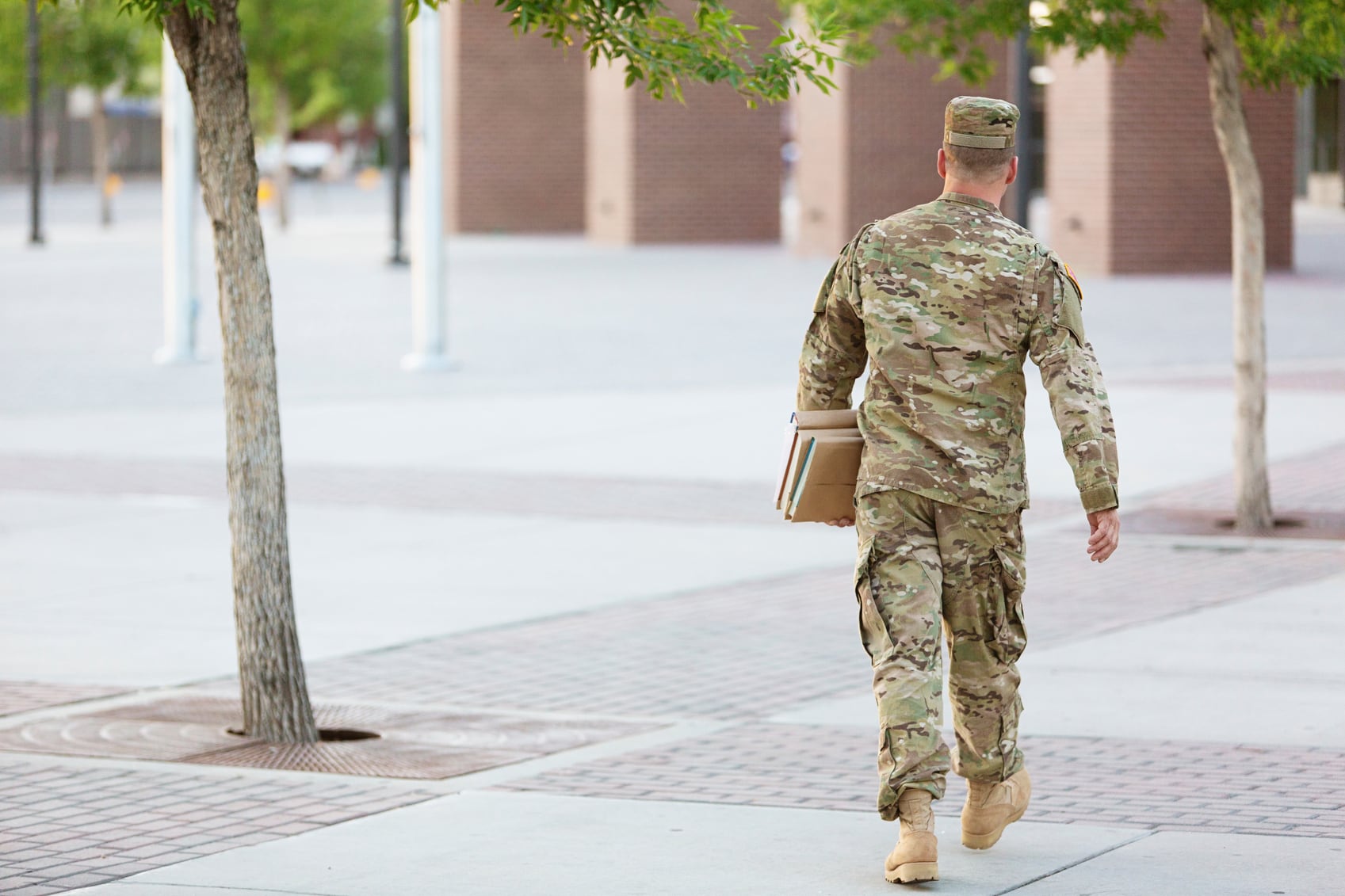At times while her husband was deployed, Cindy Brewer was so busy that when he called, she would just set up the laptop in the middle of the room for a video chat, and he would simply watch and listen to all the activity.
"It would be dinner time or bedtime, and I'm not paying any attention to my husband, but he just took pleasure in seeing us cook, or have dinner, or me race around. He'd often ask for that. I think that was reassuring to him," she said. "The kids would pop over, 'Oh, Daddy, look,' pop in and out of the screen from time to time.'
"He could kind of be there, even if he wasn't really there. It was especially good for my husband."
They'd often "chat" for an hour. And the setup meant that the three youngest children, then toddlers, didn't have to sit still the whole time.
The Brewers have 11 children, ranging in age from 6 to 27 — three are grown and married. The five youngest, all girls, are adopted. Lt. Col. Bruce Brewer is a chaplain in the Utah Air National Guard now stationed at Joint Base Andrews, Maryland; they're living at Fort Belvoir, Virginia. This is the first time the family has accompanied him away from Utah.
These video chats helped the children stay connected to their father, and helped him feel a part of the busy family even while he was deployed.
There are multiple programs to help families prepare for and handle deployments, and resources like Military OneSource that offer assistance to families before, after and during the separations. But sometimes the best wisdom comes from the spouses themselves, so we checked in with four deployment-savvy spouses for some words of wisdom, whether you'll be facing your first deployment or you have several under your belt.
"There's no guidebook — every deployment is different, every family is different," said Air Force wife Amy Amsden, mother of seven, ranging from 2 to 18. "But if you have a strong family core, you can weather anything."
Lt. Col. Kevin Amsden last deployed in 2011, but the memories remain vivid, Amy Amsden said.
Some advice from these experts, and others:
1. Know what's out there. Whether it's a holiday gathering, activities for children of deployed troops, even something as simple as an oil change, find out what's available within your military community, Amsden said.
Check out the installation's website and social media feeds, and visit Military OneSource for militarywide programs. But don't forget the old-school ground game: Marine Corps wife Somer Beatty, whose husband, Chief Warrant Officer 3 Geoff Beatty, has deployed five times, suggested visiting youth activity centers and family centers for ideas, even picking up a base newspaper.
2. Find friends. Go to unit gatherings before and during the deployment to meet other spouses, Beatty said. She also found friends when she stopped into a local yarn shop, and learned how to knit, crochet and quilt. She now gets requests from others to share her skills.
3. Know your nonprofits. During a deployment in 2013, some of the Brewer children qualified for programs offered through Our Military Kids, a nonprofit that pays for activities for children of deployed Reserve and Guard members and children of wounded, ill and injured military members.
"That was great. The kids all had something special to do" based on age, ability and interest, ranging from dance lessons to sports camps, Cindy Brewer said.
The OMK activities also provided an opportunity for the children to spend time with other adults at a time when Brewer was exhausted.
Amanda Rector, whose husband is deployed with the Indiana Army National Guard, said her youngest son is using OMK funds for church camp. During two previous deployments, OMK paid for swim lessons for both boys. "It makes you feel appreciated, and makes the kids feel appreciated," she said.
The Amsden children have participated in Operation Purple camps, offered through the National Military Family Association. "Military kids are with other military kids who can relate to what they've been through," Amy Amsden said. "It's an opportunity I'd wish for every military child to experience."

Members of the Brewer family pose with a message to their deployed father during a recent vacation.
Photo Credit: Cindy Brewer
4. Be accepting.
If you need the help, Brewer said, don’t be too proud or too shy to take it. Some friends stepped up when Brewer’s husband deployed. For example, one claimed Brewer’s share of driving duties in the kids’ carpool. "That was super helpful, a big deal," she said.
5. 'Dare to ask.' Rector has realized that people want to help. "They appreciate what your family is doing and it gives them a way to feel they're serving their country, too," she said.
Cindy Brewer got better at asking for help during an especially difficult 2013 deployment, she said.
"Part of asking for help is being prepared to be hurt," she said. "Dare to ask and let it go if someone can't help. Don't take it personally. ... They may or may not step up. But if they don't, don't crawl into a hole and never ask again."
6. Learn to let go. "There were certain things I didn't fight the kids on," Brewer said. "I insist on a clean house, and I insist on [them] brushing their teeth. I gave up on wearing pajamas to bed, as long as they wear clean clothes."
7. Set boundaries. Don't feel guilty when denying requests from inside or outside the family, Amsden said. As her teenage son pondered summer-job options, she asked him to find something close to home so she wouldn't need to drive him to and from work, for instance.
"The most freeing aspect [came] after I learned to say no — shoveling off my plate until I had a plate I could handle," she said.
8. Stay connected.
Try to include the deployed service member in family life as much as possible, as the Brewers did with the video chats. Rector videotaped her son at a recent quarterback camp, so her husband could watch it. "He felt part of it, and our son was happy he could watch it," she said.
In his civilian job, Indiana Army National Guard Capt. Dan Rector teaches high school history and is a football coach. Though he's in a remote area, he's able to text and talk on the phone with their two sons, Dane, 14, and Caleb, 11, chatting about sports and other subjects.
9. Take a deep breath. Always think before you speak, text, email, write a letter or otherwise communicate with the service member. Emotions run high on both sides of deployments.
"I think showing grace and mercy to each other is good advice, too," Rector said. "You're going to have conversations you regret, but being able to easily forgive one another and move past it."
10. Be understanding. "Everybody has to do what they need to do to get it done," Geoff Beatty said (He and his wife were interviewed while in a car during their move from Camp Lejeune, North Carolina, to Camp Pendleton, California).
Things may not always be done the way the service member would do them, whether it's disciplining children, paying bills or even redecorating.
When he returned from his first deployment to Iraq, he said, "she'd redecorated the bedroom with palm trees. The last thing I wanted to see was palm trees and desert-like colors, all browns and tans. But I was happy to be home, and I dealt with it."
11. Make time for you. "If you don't, you'll start to lose yourself," said Amsden, the mother of seven.
She runs a piano studio, teaching 30 students. "That's my time to do something fundamental to my soul, which is music," she said.
She also heads to the gym every morning, with children in tow. "That's what I need to be a good mom," she said.
12. Start the countdown.
Create a visible sign of progress toward homecoming. Mark the days off on a calendar, or get creative.
One option: Count out marbles, beads, etc., to represent deployment days and put them in a jar. Each day, move one bauble from that jar, labeled "Days to Go" into another jar, labeled "Days Down." Find some other examples here.
"The worst time for me and the boys is knowing he has to go in two weeks," Somer Beatty said. "That's kind of our dreaded period. As soon as he's gone, we start a countdown."
13. Don't dwell. You'll get sidetracked by thoughts that make you anxious, but try not to stay sidetracked.
"Not that you don't think about it, because you always think about it. But you don't fret. You can't change it," Beatty said.
That also goes for dwelling on what you're giving up during the deployment. Instead, put yourself in your service member's boots, a perspective that "helps you cope, gives you sympathy, and helps you be concerned about someone other than yourself," Rector said.
14. Keep the routine. Continue with the family routine as much as possible, which provides some stability for children. Beatty posts a schedule, so her boys know exactly what they have to do and when.
Senior reporter Karen Jowers covers military families, quality of life and consumer issues for Military Times. Email her at kjowers@militarytimes.com.
Karen has covered military families, quality of life and consumer issues for Military Times for more than 30 years, and is co-author of a chapter on media coverage of military families in the book "A Battle Plan for Supporting Military Families." She previously worked for newspapers in Guam, Norfolk, Jacksonville, Fla., and Athens, Ga.





